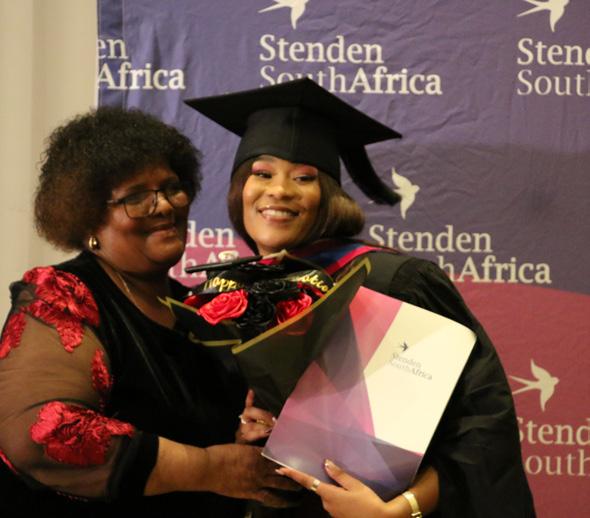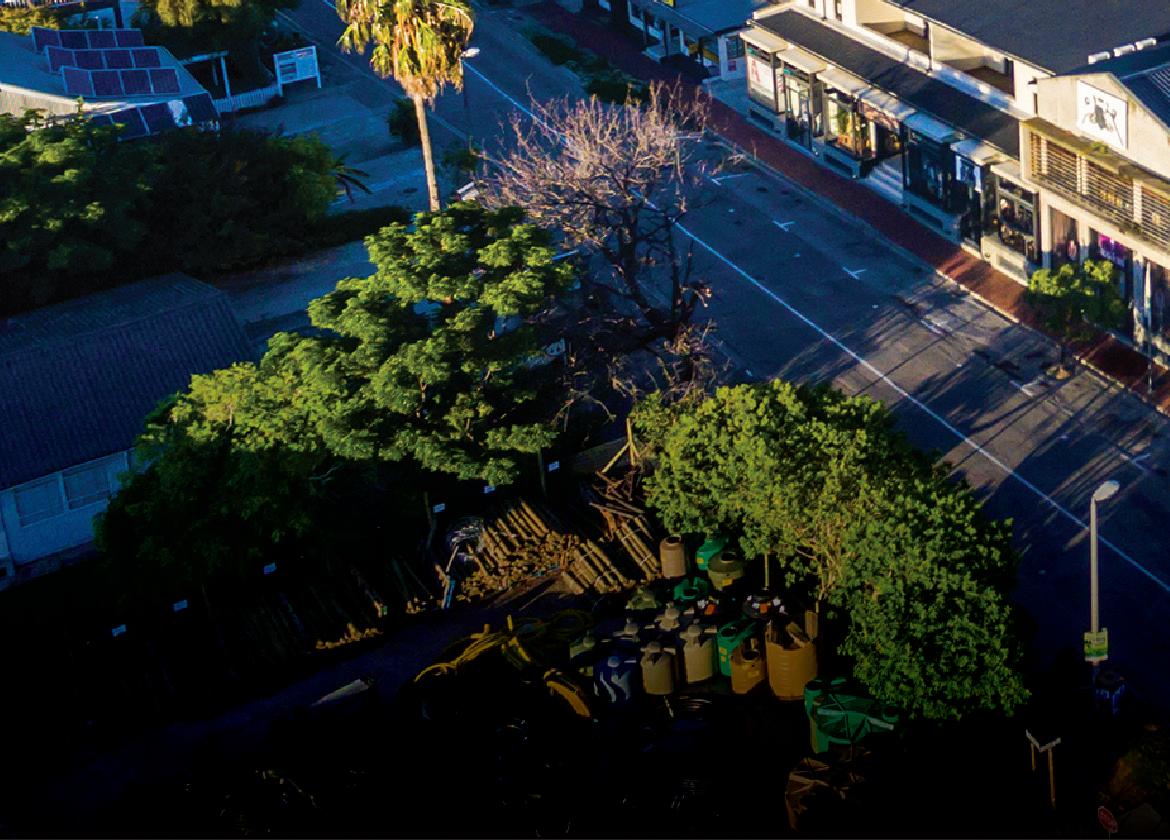


Table of Contents
8-9 11 12 15 6-7
Tertiary Institution
Collaboration

Book Launch: The Man Who Changed a Landscape: Adrian Gardiner Story Tips for Travelling Young
Au Pair : A Hot Travel Trend
For Young Africans
Stenden South Africa: Why Study Here?




8-9 11 12 15 6-7
Tertiary Institution
Collaboration

Book Launch: The Man Who Changed a Landscape: Adrian Gardiner Story Tips for Travelling Young
Au Pair : A Hot Travel Trend
For Young Africans
Stenden South Africa: Why Study Here?
Welcome to the latest edition of Tourism News Africa, where we proudly dedicate this issue to Celebrating Africa’s Next Generation of Travellers.
The energy, curiosity, and innovative spirit of Africa’s youth are reshaping the landscapes of travel, hospitality, and conservation. This month, we bring you stories that capture their courage, adaptability, and commitment to making a meaningful impact on the continent and beyond.
In an exceptional choice for Hospitality and Disaster Relief Management Studies, we explore the transformative education offered by Stenden South Africa in Port Alfred. Through its pioneering Problem-Based Learning approach and unique Grand Tour program, Stenden is nurturing the next wave of leaders in hospitality and disaster management. These graduates are not just academically equipped but are work-ready, stepping into industries desperate for their practical skills and global perspectives.
The feature on Au Pairing: A Hot Travel Trend for Young African’s introduces Misherlien Paauw, whose two-year journey as an au pair in South Africa exemplifies the power of cultural immersion. Her story of personal growth, crosscultural connection, and embracing challenges reminds us that travel is about more than seeing new places—it’s about discovering one’s own potential and building bridges between communities.
We also celebrate a titan of ecotourism in The Man Who Changed a Landscape: The Adrian Gardiner Story. This compelling biography by Dean Allen chronicles the life of Adrian Gardiner, whose vision transformed South Africa’s Eastern Cape through the iconic Shamwari Game Reserve and Mantis Collection. His story is a testament to the power of teamwork, resilience, and a deep belief in restoring both ecosystems and communities—a legacy that inspires young environmentalists today.
Finally, Tips for Travelling Young offers a treasure trove of practical advice for young adventurers. From packing light to learning local phrases, these tips encourage Africa’s youth to explore with confidence, curiosity, and an open heart, turning every journey into a life-changing education.
Africa’s next generation of travellers is bold, purpose-driven, and unafraid to chart new paths. Whether they’re studying in Port Alfred, immersing themselves in new cultures, or drawing inspiration from visionaries like Gardiner, these young trailblazers are redefining what it means to travel and lead. As you dive into this issue, we invite you to celebrate their stories and join us in envisioning a future where Africa’s youth continue to shape a more connected, sustainable, and vibrant world.
Happy reading, and here’s to the journey ahead!

Derek Martin Editor


What inspired you to pursue a career in hospitality?
I’ve always loved working with people and making them feel welcomed and valued. Hospitality felt like a natural fit for me because it allows me to do that every day. There’s something special about creating memorable experiences for others. It’s what keeps me motivated.
Where do you see your career heading in this industry in the future?
I see myself growing into a leadership role hopefully in front office management or marketing. I’d love to be part of a team that shapes how a brand connects with its guests. I’m also passionate about mentorship, so I see myself helping future hospitality students find their path the way others helped me.

How did your education prepare you for this industry?
My studies gave me a solid foundation across almost every department in hospitality. I got to see both the good and the challenging sides of the industry. It taught me what it takes to run a hotel, guesthouse, B&B, and more—and gave me the tools to manage an establishment efficiently and professionally.
Why did you choose to study where you did?
To be honest, I didn’t have much of a choice at the time. I initially wanted to study professional cookery, but after earning a bachelor’s pass in Matric, I decided to challenge myself and go for a Bachelor of Business Administration in Hospitality Operations instead—which led me to where I studied.

“Education is the quiet force that transforms potential into purpose, lighting paths where there were once only shadows.”
What unique qualities do you bring to the hospitality industry that reflect your personality or cultural background?
My open mindedness, ability to be empathetic as well as hardworking in this Industry are qualities I feel that I have both personally and professionally. These qualities come from my background growing up in Zimbabwe, teaching me these lessons to work and move forward.
Where do you see your career heading in this industry in the future?

Possibly going abroad and still viewing the world. I’m still young, therefore, I’m also open to whatever opportunities come to me. I believe it’s about the journey as everyone states so I’m taking my time to enjoy and move through this industry with passion.
What specific area of hospitality (e.g., hotels, tourism, events, food and beverage) excites you the most, and why?
While I love the industry as a whole, I’m currently most drawn to hospitality marketing. My experience in hotels has taught me what guests really care about, so I enjoy using that insight to connect with them and spark excitement about their trip before it begins.
Has the hospitality industry always been a passion of yours? What ignited this passion?

Yes, and that passion has only grown. It began with a love for hosting—shaped by our family guesthouse and family road trips. I saw how travel connected us, and I wanted to create that feeling for others. Hospitality lets me work in a dynamic, people-focused industry with purpose: connecting people, celebrating culture, and protecting the places we love.

“Education is the passport to the future, for tomorrow belongs to those who prepare for it today.”
The Tourism News Africa Team were privileged enough to attend the recent book launch of The Man Who Changed a Landscape: The Adrian Gardiner Story. The launch was held at the My Pond hotel in Port Alfred, an appropriate venue as the Eastern Cape is the very landscape that Adrian Gardiner has transformed. In attendance at the launch were a number of South Africa’s top hospitality and tourism leaders, industry experts and academics with inspired students from Universities in the area.
Best-selling author Dean Allen spent 3 years researching and writing this inspiring biography, which chronicles the extraordinary life of Adrian Gardiner - visionary conservationist and ecotourism pioneer who transformed South Africa’s Eastern Cape through his relentless determination and innovative spirit. The book details Gardiner’s journey from humble beginnings to founding the iconic Shamwari Game Reserve and the Mantis Collection, both of which reshaped wildlife tourism and conservation not only in Southern Africa, but has established the global blue print for eco-tourism success.
Two centuries ago, the Eastern Cape was a thriving ecosystem where elephants and other wildlife roamed freely. By 1989, however, the land had become barren, stripped of its biodiversity due to overgrazing and environmental neglect. Where others saw desolation and dispair, Adrian Gardiner saw potential. The book recounts how Gardiner, driven by a deep belief in the land’s promise, embarked on a mission to restore this once pristine landscape. The establishment of Shamwari Game Reserve stands as a testament to his foresight,

turning a degraded landscape into one of Africa’s premier wildlife destinations.
Dean Allen’s narrative captures the challenges Gardiner faced, from logistical hurdles to the daunting task of reintroducing wildlife to the region. Through meticulous research and engaging storytelling, the book highlights key moments in Gardiner’s career, such as the relocation of elephants and other species to safer habitats, despite the heartbreaking losses during the process. These efforts not only revived a vital ecosystem but also set a global standard for sustainable tourism.
Having had the privilege of reading the biography, the TNA team believe that this is so much more than just the story of one man’s life, but rather a story of hope and transformation. Allen portrays Gardiner as a man of courage, whose work extended beyond conservation, to the empowering of local communities as well as the next generation of environmentalists. The book delves into Gardiner’s philosophy of building strong teams, a principle that underpinned his success across his tourism ventures. Whilst interviewing Adrian Gardiner, this idea of the team being more important than any one individual is clear. Whilst arguably one of the most recognised and respected names in conservation and ecotourism, Gardiner refuses to take all the credit, but refers to the success as all part of a great team effort. Gardiner’s influence continues, as he remains a beacon of innovation and change which is seen in his ongoing projects, and thriving ecosystems which he has helped restore.

“For those seeking inspiration or a deeper understanding of ecotourism’s potential, this book is a must-read”

Dean Allen’s writing and storytelling ability brings Gardiner’s story to life, blending historical context with personal anecdotes to create a rich, immersive read. The book appeals to readers interested in conservation, entrepreneurship, and stories of how an individual can have a real impact on an entire industry. The biography also serves as an invitation to visit Shamwari Game Reserve, where the landscapes and wildlife Gardiner revived offer a living testament to his legacy.
The Man Who Changed a Landscape: The Adrian Gardiner Story is available in various independent book stores throughout South Africa, but is easily purchased online, here.

Chris Midgley News Correspondent


aving travelled solo in my youth, I learned early that the world is both wider and more connected than we often imagine. Studying, working, and exploring across different cultures taught me how to navigate both the world and my own independence. Whether you’re backpacking, studying abroad, or travelling on a student budget, exploring young is one of the best educations. Here are the key tips and lessons that helped me most.
Choose experiences over luxury
Hostels, homestays, and budget stays often lead to the best stories. On Rodrigues Island, we saved by staying at a local B&B, eating street food, and enjoying free activities like hikes and markets. Always keep an eye out for accommodation and experiences offering discount codes or special deals – booking platforms and websites often run promotions that stretch your budget further.
Know local transport
Don’t assume every place runs like home. In Mauritius, I got lost because the buses had no fixed schedule. Namibia? No public buses at all. A little research beforehand goes a long way.
Pack smart
If you can’t carry it upstairs or squeeze it into a small car, leave it. And check the weather—walking 3km in the sun isn’t the same as 3km in a downpour.
Cosmetics: Only the essentials
Shower gel, haircare, skincare - travel light. Heat and pressure can cause leaks, and losing your favourites is not worth the mess.
Always carry some cash—then haggle
Many countries and independent hawkers and traders prefer cash. I noticed this most often when using public transport and buying street food. In the markets or more informal type establishments the more I negotiated, the cheaper I was able to get it. If bargaining is part of the culture, don’t be shy - just do it respectfully.
Be practical with souvenirs
Not all keepsakes travel well—spices spill, glass breaks, and heavy things can add additional costs when travelling back home. Choose souvenirs that won’t ruin your bag or your budget and take a moment before buying something you might not really need.
Learn a few key phrases
A simple “hello” or “thank you” can open doors, earn smiles, and get you better service, especially if it is in the local language. People appreciate when you make the effort.
Keep key info offline
Screenshot or print your passport, bookings,and emergency contacts. Wi-Fi isn’t always reliable.
Stay safe, stay connected
Let someone know where you are. Independence is great, but checking in saves worry.
It’s okay to say no
Not every activity will suit you. If something feels off or not aligned with your values, trust your gut, and say no.
Don’t over-plan
Leave space for surprises. Some of the best moments happen when things don’t go to plan, when you take a wrong turn, miss a bus, or say yes to a spontaneous invite.
Travel insurance is non-negotiable
It’s not exciting, but it’s essential. If you fall ill, get injured, or your trip gets cancelled, you’ll be glad you had coverage. While you’re at it, get to the airport early—delays happen, and running to your gate is no fun.
Travelling young isn’t always easy but it’s always worth it. It teaches you to adapt, to trust yourself, and to see the world with curious eyes. So go - eat street food, pack light, learn a few local phrases, and chase the moments that challenge and change you.

Roux-Ché Shidute
News Correspondent

“Being an African au pair in my youth wasn’t just about looking after children in foreign homes — it was a passport to the world.”
Imagine being a part of a new culture, developing new skills, forming friendships, and finding your genuine self, not just another tourist. Doesn’t that seem exciting? Welcome to the world of Au Pairing, a groundbreaking journey that is altering the perspective of young Africans.
Simple holiday getaways are a thing of the past. Young Africans today are looking for profound experiences that will test, teach, and change them.
It’s about living in a foreign community, stepping away from your comfort zone, and truly integrating into it. Au Pairing transforms ordinary living into a thrilling journey, whether in Kenya, Ghana, Nigeria, or Morocco. It’s an opportunity to develop; you gain understanding, adaptability, and, above all, confidence in yourself.
Misherlien Paauw’s two years in South Africa as an AuPair were a life-changing experience filled with personal growth, cultural exploration, and genuine fulfillment.
She was driven by a desire to push herself and venture outside her comfort zone. “I wanted to explore life beyond what I was used to and see how I could contribute in a different environment,” she says. She started her journey in the Western Cape when she discovered the vast amount of knowledge she could gain from embracing many viewpoints and cultural interactions within her own continent.
There were multiple special occasions throughout her stay with her host family. One of the most significant was how they welcomed her with open arms and shared their varied origins, making them feel like a second family. “I realised how much diversity improves life after living with a family that welcomed me and shared their traditions. We combined our many cultures into a one, common experience,” she explains. Her understanding of community and belonging was greatly impacted by these integration and connection moments.
There were challenges along the way, of course. It took a while to get used to the local way of life and traditions. “A big surprise was how different food preferences were, feeding into their local dishes was an eye-opening experience,” she says. She also learnt how to handle interactions with others among other cultural differences. “We had different values, but finding common ground, like sharing meals and conversations, helped us build a shared sense of family,” she continues.
to encourage their peers to use the simple gestures of “please” and “thank you,” which demonstrated their maturity, was one of her proudest moments. “Knowing I played a part in their growth made me feel truly proud,” she says.

Each moment was an opportunity to learn. She noticed that she was becoming more patient and accountable in her experience. “I realised how much I was learning each day, watching the kids grow, helping them navigate new skills, and just being part of their lives,” she says. Seeing her host children begin
Her first trip to Table Mountain was one of her most memorable experiences. “That moment reminded me of the incredible beauty found right here in South Africa, and how important it is to take time to appreciate our natural surroundings,” she continues. She also had a deep appreciation for local food after learning about the variety and depth of local flavours. “The different food traditions across regions like Cape Town and Johannesburg are filled with history and culture, they’re like tasting stories,” she explains.
In retrospect, Misherlien believes her perspective on life has significantly changed. “This journey made me more open, more independent, and more connected with my roots and community,” she adds. What was the most important lesson she learned? “I never imagined that I would become as strong and versatile as I have. I learned from this encounter that we are far more capable than we frequently realise.
Her advice to other young Africans considering Au Pairing : “Just do it! It’s more than babysitting; it’s about forming relationships, discovering your own potential, and creating opportunities you never would have thought possible. You will always carry this journey with you.
For those who have the courage to venture beyond boundaries, the future is yours. Young Africans, you only need to make a choice to go on your next great journey. Discover, expand and succeed. The continent is waiting for you. Let the adventure begin!
“Each journey taught me resilience & bridged cultures.”

Lizelle Smith News Correspondent
“As an industry, both the hospitality and disaster management industries are in desperate need of skilled, work-ready candidates –Stenden is delivering these in spades.”
Nestled in the picturesque coastal town of Port Alfred, Stenden South Africa is arguably the stand out, premier, private higher education institution for students who are looking to pursue a degree in Hospitality Management (B.Com) or Disaster Relief Management (BBA), as well as a career in both of these focus areas. As an accredited Higher Education institution, Stenden South Africa offers a unique blend of academic rigor, practical experience, and global exposure, making it an ideal choice for those looking to enter the workplace and make an immediate impact.
One of Stenden’s defining strengths is its Problem Based Learning approach, which ensures graduates are exceptionally prepared for the workplace. Unlike traditional lecturebased programmes, Stenden emphasises a more “hands-on” experience through its innovative Problem-Based Learning (PBL) and Case-Based Learning (CBL) methods. In the field of Hospitality Management, students gain practical skills by working at various hospitality properties, including the MyPond Hotel, a learning company based just off campus, where students shadow

and manage real-world hotel operations. Similarly, Disaster Management students participate in practical field exercises, such as simulations at Port Elizabeth International Airport, as well as collaborating with industry partners like the African Centre for Disaster Studies. These experiences equip graduates with the ability to tackle complex challenges, think critically, and implement solutions effectivelyskills highly valued by employers in both sectors.
As an industry, both the hospitality and disaster management industries are in desperate need of skilled, work ready candidates – Stenden is delivering these in spades.
Stenden’s commitment to practical training further extends to its Grand Tour program, a pioneering initiative that allows students to study a minor at one of NHL Stenden’s international campuses. This global exposure broadens students’ perspectives, enhances cultural competence, and fosters adaptability - qualities essential for thriving in the interconnected fields of hospitality and disaster management.
Examples of the Grand Tour program in action are a Hospitality student exploring and gaining practical experience in event management while





in Bali, while a Disaster Management student could study crisis response in Leeuwarden, Netherlands. This international experience not only enriches their education but also gives graduates a competitive edge in the global job market.
The institution’s student-centred philosophy, rooted in internationalisation and research, further enhances its appeal. The small class sizes and a value-driven approach create a supportive environment where students from diverse backgrounds feel empowered to grow. Stenden’s strong industry connections and partnerships together with various disaster management organisations, provide internship opportunities and networking, ensuring graduates are job-ready. Additionally, the vibrant campus life in Port Alfred, with facilities and residences, balances academic and social development, fostering wellrounded professionals.

In conclusion, Stenden South Africa in Port Alfred is a top-tier choice for students seeking careers in hospitality or disaster management. Its Problem Based Learning model and approach, together with the unique Grand Tour opportunity produce graduates who are not only academically proficient but also practically skilled, globally minded and ready to make an impact in the industries they are entering in. By choosing Stenden, the students invest in an education that prepares them to excel as innovative leaders in their industries. Keep an eye out on these students.
I suspect we will be hearing great things about them and their impact in these industries.

Chris Midgley News Correspondent





Located in the heart of Knysna, the world-famous Garden Route - South Africa’s jewel of forests, beaches, and tranquil lagoons—aha The Rex Hotel is a sophisticated retreat where timeless elegance meets coastal charm.
Guests are welcomed with warm hospitality and superior service, all wrapped in contemporary comfort that makes every stay unforgettable.
A highlight of the experience is the Saltwater Bistro, a casually chic space with vintage-inspired decor, raw brick walls, and leather finishes. Its relaxed atmosphere and delicious breakfast, lunch, and dinner options - ranging from hot dishes to continental classics—make it the perfect spot to start and end your day. Enjoy your morning co ee on the sunny outdoor terrace before heading out to explore the natural wonders of Knysna.
Whether you’re here for adventure or escape, The Rex o ers the perfect balance of style, comfort, and culinary delight.







